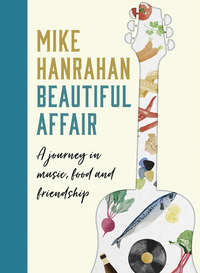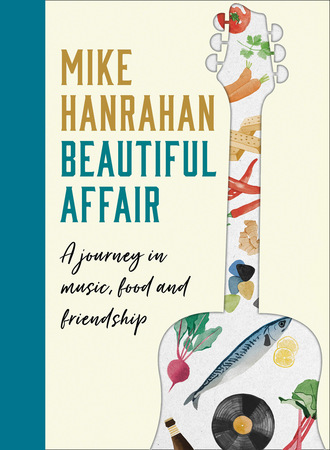
Полная версия
Beautiful Affair
Once a week they travelled to Ennis to shop at Mick O’Dea’s grocery and pub. From the street you entered a shop stocked with everything from the humble spud to packs of washing powder and everything in between. A door then led you to a small bar with a high counter usually housing a row of creamy pints. It was the most beautiful bar in the world, not for its decor, which was very retro, but for its clientele, its history and most of all the friendly atmosphere. Micky usually had a few in there while Aggie filled the messages box with the help of the shopkeepers in their brown coats, who later delivered to the cottage.
The O’Deas are practically cousins to us, such was the closeness of the two clans. I went to school with young Mick O’Dea, who followed his passion for art and is now a member of the Royal Hibernian Academy and has served as its president for a number of years. His work is exhibited internationally and he is regarded as one of our greatest portrait painters. Some of his work adorned the walls of the pub when his older brother John ran it after their dad retired. Sadly, John also retired, and with him went much of the pub’s character and charm. Christmas week at O’Dea’s was particularly wonderful, as the townies returned from all over the world to reconnect for the festive season. A small transistor radio sat on the shelf in between various trinkets and was only switched on for news or late-night specialist roots music shows. In the adjacent room, once the family sitting room, the TV transmitted sports and The Late Late Show to a select club of locals seated in front of a constant burning fire.
The grocery business was very important to my grandfather’s generation. All the essentials were there: tea, butter, biscuits, cornflakes, cleaning supplies, all packed into large apple boxes and delivered on the day of purchase. O’Dea’s supplied many families with their weekly shop, but it was also a place of social gathering. There was a bond of trust and friendship within its community. As the years passed supermarkets forced many of these beautiful quaint shops to close, but in the case of O’Dea’s groceries, it was another harbinger of modernity, the health and safety officer, who finally closed the door for ever. A rarely used meat slicer on the counter drew her attention, and she instructed John that if he was to be selling fresh food, he’d have to add structural changes, which included a sink with hot and cold running water. John explained that he sold very little food, and was simply looking after a few of his older customers who had been coming for years; it wouldn’t be worth his while putting the extra money in for such a small return. When she insisted, John sighed and said, ‘Mam, there’s a terrible siege going on over there in Sarajevo, and I hear there’s hardly any food getting in at all. Yet I bet you the price of the sink that they sell more cold meat in downtown Sarajevo of a Saturday morning than I would here in a month of Sundays.’ Unfortunately, his pleas fell on deaf ears and within weeks the few groceries were replaced with bottles and cans of beer as the pub engulfed what was left of the grocer’s counter. Years of public service came to an abrupt end. Five generations of my family frequented O’Dea’s pub, either sipping porter, drinking orange or buying supplies, while others preferred their mugs of tea with a little chat upstairs in Mrs O’Dea’s kitchen.
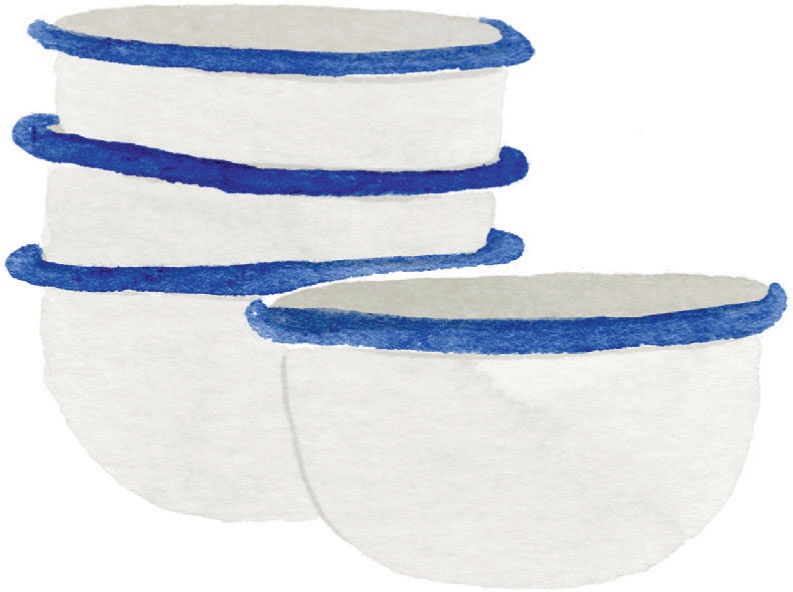
AGGIE HANRAHAN
My father’s mother, Aggie, was formidable, the matriarch who ruled the house. In fairness, someone had to, as Micky was very easy-going and prone to stray onto the missing list. She ran the household with absolute authority, and cooked and baked the most delicious breads, cakes and scones. I still smell the griddle cake as she lifted it from the oven onto the table next to the butter dish and a pot of her homemade jam.
Aggie baked with sour milk purchased from a neighbour down the road. These days sour milk is not recommended and has been replaced with the conventional commercial product buttermilk. Since pasteurisation, souring your own milk is now a thing of the past. My mother usually left the bottle of milk out in the air to sour naturally before baking.
Aggie’s griddle bread
Makes one loaf
A little butter or oil, for greasing
350g plain white flour
A pinch of salt
1 tsp baking powder
1½ tbsp sugar
1 egg, beaten with 2 tbsp melted cooled butter
1½ tbsp melted butter
300ml buttermilk (you may not use it all)
Butter and homemade jam, to serve
1 Grease a griddle pan or heavy frying pan with a little butter or oil.
2 Sieve the flour, salt and baking powder into a bowl. Add the sugar. Whisk the ingredients further to add more air.
3 Add the egg, butter and most of the buttermilk. Gently bring together. If it’s too dry, add more milk, but we don’t want a very wet dough. Do not knead, as that will take the air from the mix. Shape to the size of the griddle pan, and ensure the dough is about 5cm thick.
4 Cook on a medium heat for 10 minutes.
5 Flip and cook for another 10 minutes.
6 Cut into wedges, and serve with butter and homemade raspberry jam.
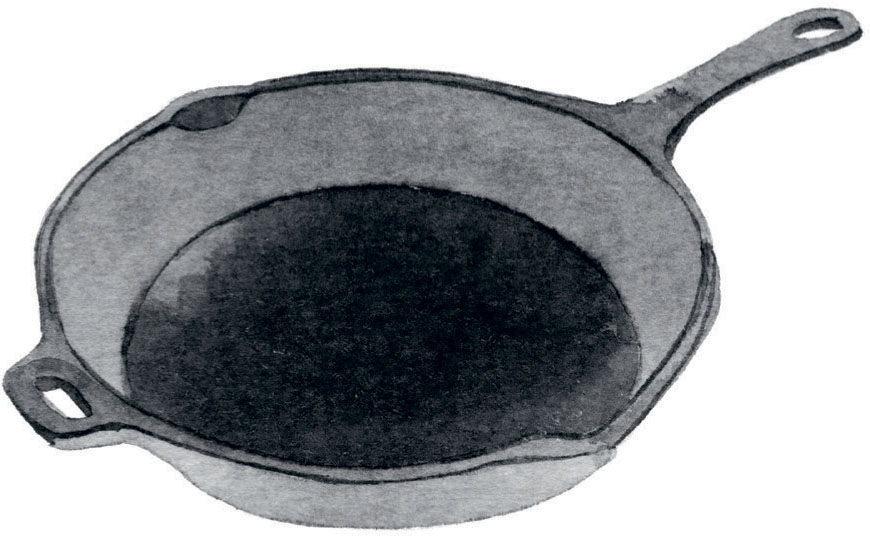
Nana kept between fourteen and twenty goats in an old outhouse shed. Once a year they were herded west along the road to meet their puck, then returned to the farm and were encouraged to roam freely throughout the crag, where they feasted on nuts and roughage. They were never allowed too much time on grass, as it added far too much fat to their bodies. Kid meat was regular Easter fare in Clare, long before we turned to lamb, and the preparation of the feast varied from house to house. The meat certainly needed slow cooking, and some added juicy seasonal berries in with the roast for extra flavour, constantly basting. Others braised the meat in a broth of vegetables. The family drank the goat’s milk, and my uncle Chris says that excess goat’s milk might inadvertently find its way into the churn of cow’s milk before it was sent to the creamery. No waste was allowed, and no one said a word. Some families made yogurt, or their own version of soft cheese. One of Ireland’s best goat’s cheeses, St Tola, is made on a family farm in Inagh in County Clare run by Siobhán Ni Ghairbhith and her team, who produce a variety of stunning hard and soft cheeses.
Aggie reared her goats for the Easter celebrations, but her pride and joy were the Bronze turkeys, with each member of the family receiving one every Christmas. Some did better out of it than others, though – once she posted a turkey over to her son Tony in Birmingham, but somewhere along the line the parcel was held up and arrived two weeks after the Christmas celebrations. By all accounts the scene when it was opened was not for the faint-hearted, and left an indelible mark on the poor children present.
Aggie’s kitchen was the hub of Hanrahan life. The half door was constantly open for all to call and say hello. She always sat by the range while Micky sat at the table with his tiny transistor radio waiting for the latest result from Leopardstown. It was a great room for chat, food, music and gossip, and over the years a lot went on in that small confined space around the kitchen table with its ever-present pot of hot tea.
MOTHER
She’s an angel, my angel, she moves me, she sees the child in me
Won’t abandon me, my angel
– ‘Angel’, Someone Like You (1994)
My mother was taken from school in her very early teens and sent to work at Fawl’s on O’Connell Street in Ennis. Fawl’s was a pub, shop and tea importer also known as the Railway Bar. Large tea chests arrived from Dublin and the tea was bagged for sale. When we were babies our playpen was one of those tea chests. Dad fixed a bicycle tyre round the top for safety and all was going well for a couple of years until my brother Kieran worked out a way to topple the chest and crawl to freedom. In the evenings after the long journey home, my mother helped with household chores and tended to the needs of her four brothers. I have difficulty understanding why her parents chose that path for her, cutting short her education at such a young age, but she never discussed it much with any of us, and explained it away as being a different time. She never really spoke much at all about her childhood, but her photographs always show a smiling, beautiful young girl. She met my father when they were both young, fell in love and spent the rest of their lives falling deeper and deeper into that love.
My mother and I share a great passion for food and for many years we exchanged various tips over the phone or on my short visits home. I never left home without a plate of her luscious scrambled eggs and toast to set me on my early-morning journey back to Dublin. She was a brilliant cook and baker. After years of trying, I finally managed to record some of her baking recipes.
‘Right, Mum, are you ready to give up those recipes?’
‘I suppose so.’
‘So, Mother, your bread recipe – that brown one we all loved so much …’ I switched on the Dictaphone. She eyed it suspiciously.
‘I’m not talking into that yoke, Mike.’ I quickly found a pen and opened my copy book. I was very excited; my mother was about to give up the family’s secret recipes.
‘Well, for the brown, I get a fist or two of plain flour; a fist of the brown flour; a fist of bran; pinch of salt; a good pinch of baking soda – not too much, because that sometimes turns it a bit yellow although it never stopped ye all from eating it. I suppose it’s all really down to practice. After a while you get to know the ingredients and the feel of the mix, y’know. Oh yes – I sometimes add a little bit of sugar. Sometimes I might add raisins, or currants, although I never liked using the currants for some reason … I preferred using the larger raisins. And sometimes a pinch of ginger, or allspice. And sure, it really came down to what I had in the cupboard. That’s it.’
‘What was wrong with the currants?’
She dipped her head, grimaced and eyed me over her spectacle rims, ‘Sure I was eating most of them, Mike.’ She continued.
‘Well, then you need to mix them all with margarine or butter, half a pound or thereabouts, but I preferred the margarine, and then add an egg. Maybe not a full egg, it’s hard to know, Mike, you just have to judge it. After that I added some sour milk to bring it all together – not too wet, but it can’t be dry either.’
‘What happened if you had no sour milk?’
‘Well … if I had no sour milk, I would add a drop of vinegar to the good milk and that would sour it over about ten minutes. Did I mention not to use a full egg?’
‘Why did you bake the bread in a frying pan?’
‘Well, it was an old frying pan, and your father knocked off the handle for me as I thought it would make a good baking tray. It did – I used the same one for years and years. I’d butter the pan, put the paper at the bottom, pour the bread mix in and draw a sign of the cross on top with the knife and into the oven for about an hour or thereabouts. I’d turn the bread out then and leave it on top of the range, covered with a damp towel until we were ready to eat it. And that’s it, Mike. Very simple. And shur, ye loved it. Or at least that’s what ye told me, anyway.’
It was beautiful – not so sure about the simplicity of the recipe, though.
She went on to talk about her stews, casseroles, her mother’s cheese and that horrible homemade butter – she admonished me once again for my description of the butter. I had a beautiful afternoon with Mum, even though the baking lesson lasted minutes, but it was good to talk food with her. I could not wait to get back to my own kitchen to try out the recipes for myself and translate those fists into grams …
MY MUM’S RECIPES
After much trial and error, I managed to translate Mum’s measurements. I’m thinking a fist of flour is about 150g. So, we can take it from there.
Mum’s brown bread mix
Makes one loaf
300g coarse wholemeal flour
300g plain white flour
2 tsp bicarbonate of soda
1 tsp salt
2 tsp brown sugar
100g soft margarine or butter
1 egg
450ml buttermilk
Butter, to grease
1 Preheat the oven to 200°C/180°C fan/gas 6.
2 Sieve the white flour, bicarbonate of soda, salt and sugar into a bowl containing the brown flour, and mix gently.
3 Rub in the margarine or butter with your thumb and forefinger to crumb stage.
4 Beat the egg into the milk. Make a well in the dry mixture and pour in the milk. Bring it all together. It should be a wet mixture.
5 Butter an old frying pan (if you have one) or a 1lb loaf tin and pour in the mix.
6 With a knife cut across and down the centre of the loaf, and bake in the oven for 1 hour.
7 Remove the bread from the oven, turn it in the pan, then cover with a damp tea towel for one hour before serving.
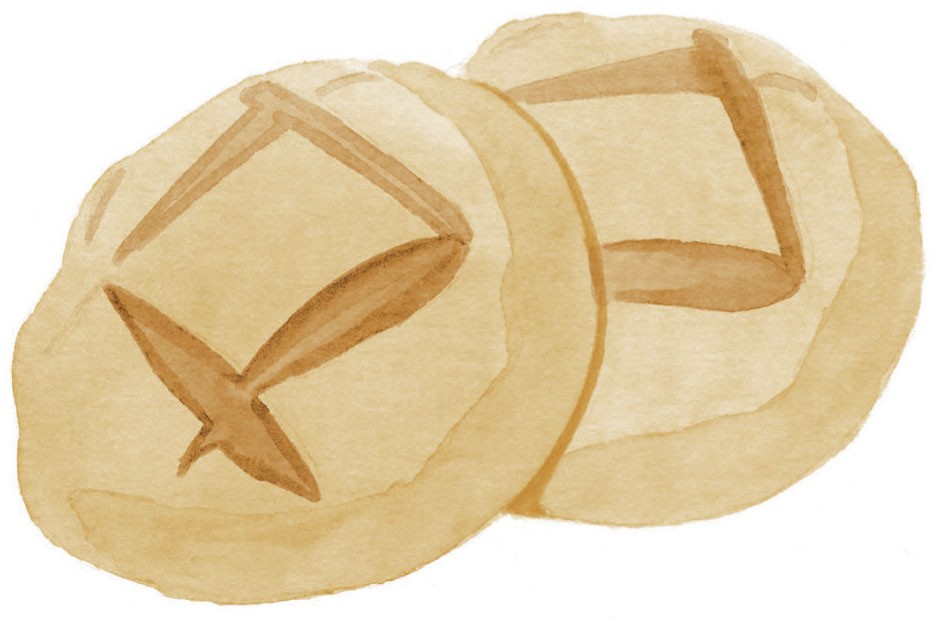
My mother’s spot of dick
Makes one loaf
Mum sometimes omitted the treacle and used a mix of brown and white flour. She preferred the large golden raisins. This recipe is open to any fruit, but the harder dried fruits will benefit from a little soaking before use.
Butter, to grease
500g plain white flour
2 tsp baking powder
A pinch of nutmeg
1 tsp salt
200g coarse brown flour
100g soft margarine
1 tbsp treacle (optional)
1 egg, beaten
400ml buttermilk
150g raisins or sultanas
1 Preheat the oven to 160ºC/140ºC fan/gas 3.
2 Butter a heavy oven-safe skillet or loaf tin and line it with baking parchment.
3 Sieve the white flour, baking powder, nutmeg and salt into a bowl. Add the brown flour and mix gently.
4 Rub in the soft margarine to crumb stage.
5 Add the treacle, if using, and mix with a spatula or wooden spoon.
6 Add the egg, buttermilk and dried fruit. Mix gently and transfer to the prepared skillet or tin.
7 Bake for 1 hour, then remove from the tin, turn it upside down on a wire rack and cover with a damp cloth.
MUM AND HER ORANGE BIRTHDAY CAKE
January is when the Seville oranges come in, with many households creating their own distinct marmalades. My aunt Peggy’s won hands down in our family, and she often added some lime to her marmalade. For many years my mum celebrated her birthday on 5 January, until the year she got her first passport for a once-in-a-lifetime trip to America to celebrate my brother Kieran’s marriage to Mayo woman Pat Baines. Up to that point she had never needed her birth certificate, so when it arrived in the post, she was shocked to discover that she was in fact born on 6 January. I think we had two celebrations that year, and we’re all still a little confused when the date comes around.
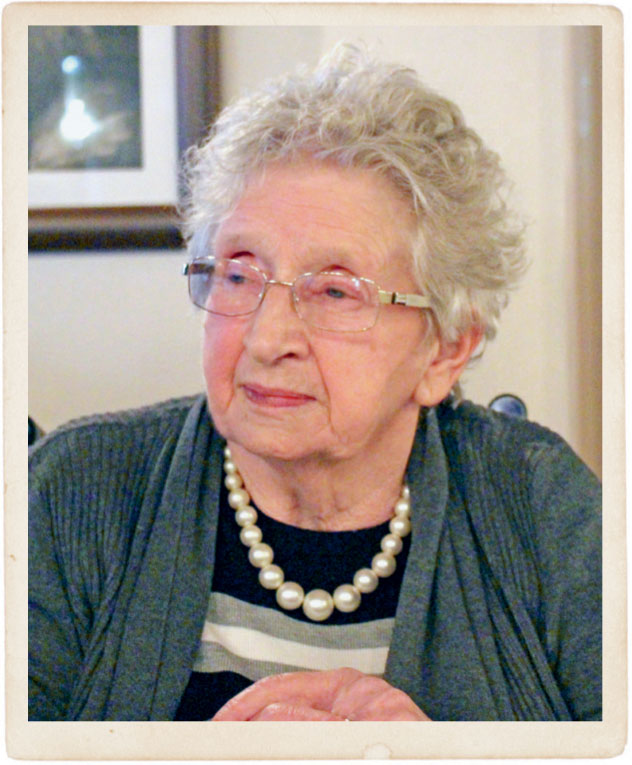
For one of her birthdays, I made a three-tier orange cake, complete with orange butter icing and strips of sweetened orange zest scattered over the top. I insisted on icing it at home in Dublin before a three-hour journey to Clare. I placed the cake in a tall, sturdy-looking box, wedged into the back seat of the car with my bag and a denim jacket. When I arrived in Ennis I glanced over my shoulder to see the cake box keeled over, and melted icing drifting slowly like lava onto the seat and all over my lovely denim jacket. Mercifully, my sister Jean arrived with the repair kit and we somehow managed to rebuild and camouflage the damage just in time.
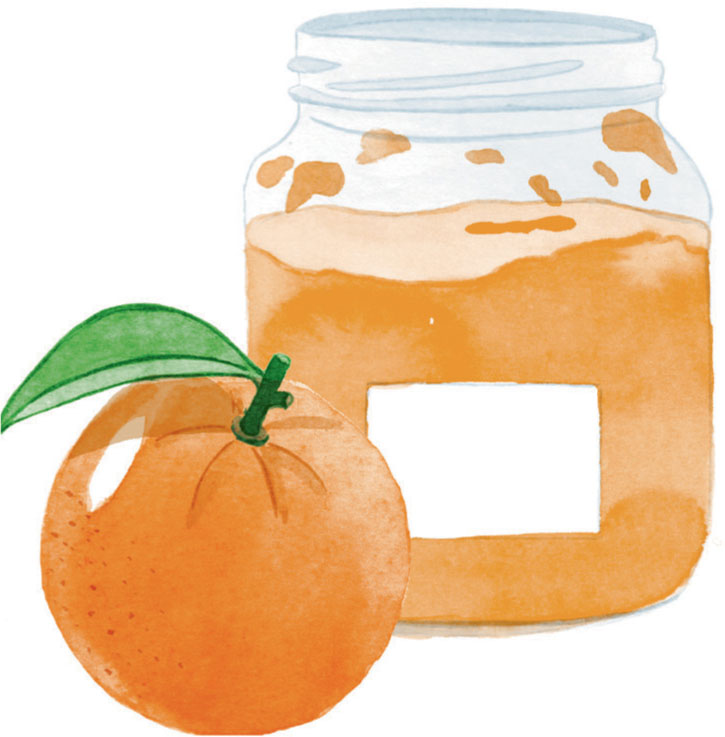
Flourless orange cake
Makes one 26cm cake
200g caster sugar
100g brown sugar
6 medium free-range eggs
2 oranges, boiled for 1 hour until soft (save the cooking water, quarter and remove pips, do not peel!)
250g ground almonds
1½ tsp baking powder
For the syrup:
150g caster sugar
Reserved cooking water (see above)
1 Preheat the oven to 170°C/150°C fan/gas 3.
2 Put the sugars and eggs into a food processor, or use a bowl with a hand-held blender, and slowly blitz to a smooth paste.
3 Add the orange pieces and blitz.
4 Add the almonds and baking powder, and blitz again.
5 Pour into a 26cm cake tin lined with baking parchment and bake for 1 hour and 20 minutes. Check with a skewer to ensure it’s cooked in the middle (the skewer will come out clean).
6 Meanwhile make the syrup. Stir to dissolve the caster sugar in the cooking water and boil for approximately 20 minutes.
7 Pour the syrup over the cooling cake while still in the tin. Allow to soak in and cool before turning it out onto a plate.
For a cake with more moisture:
Zest and juice a third orange and add to the cooking water with the 150g of sugar. Boil for 20 minutes or so, until you have a syrup, and drizzle this on top sparingly (save some of the boiled zest for decoration). Simply dry the zest on kitchen paper and sprinkle on top once the cake has cooled.
THE SCULLERY AND THE STAGE
Our kitchen, the scullery, was a tiny room barely ten by eight feet that housed a sink, table top and stock cupboards. All hot food was cooked on the range in the living room. After a few years Mum somehow added a hob into that tiny spot. Historically, the scullery was a room in the depths of the great mansions that was used for washing dishes and the landlord’s dirty clothes. My mum somehow managed to feed a small nation from that room. A curtain divided the scullery from a living room, the hub of many Hanrahan activities. There we drank early-morning milky egg whips, and ate breakfast, lunch and tea around a large adjustable table. Saturday dining was flexible but Sunday was the full show, a roast followed by a dessert of homemade jelly with ripple ice cream or Mum’s delicious trifle.
In the evenings after tea, a light meal, we had a group huddle around the Philips valve radio, which soon gave way to the Bush television. That room also hosted the All-Star Hanrahan Family Revue, a concert performance for visiting relatives and friends, with each of us lined up for curtain call to perform our party piece. We all played an instrument or danced, so every available space in the house was taken for practice for our many musical endeavours. Mam and Dad were very much associated with Comhaltas Ceoltóirí Éireann, an organisation founded in the 1950s to preserve Irish culture and music. They attended local meetings and assisted at all local fleadhs, with my mother and her friends making hundreds of sandwiches, and Dad along with his mates preparing and cleaning halls and rooms for performance or competition. I sang and played tin whistle with my brothers Joe, Kieran, Ger and a couple of other neighbours in the St Michael’s Céilí Band, performing at charity and village variety concerts. My sisters Gay and Jean along with other neighbours provided the dancing spectacle. Once a week we had music lessons with the great Frank Custy at the national school in Toonagh, where I won my first and only Fleadh Cheoil medal for singing the ballad ‘Kevin Barry’. I must have been only eleven or twelve. One summer, the carnival came to town and we all entered the talent contest. One by one they went to the podium, belting out reels, jigs and hornpipes at a very high standard. I went up and blurted out a rickety version of ‘Lily the Pink’ and took the crown – well, a shilling, but it was as good as any crown to me. My very talented brothers and friends were not at all amused.
PRAY FOR US
The living room was also a central room of prayer under the watchful eyes of the Sacred Heart, the child of Prague, the mother of Perpetual Succour and the Lord himself staring down from his crucifix. Every night we knelt to recite the longest Rosary in the history of the Catholic Church, with Hail Mary, Holy Mary, Hail Mary, Holy Mary, followed by the Glory Be into a litany of add-ons that included Prayers for the Faithful, blessings for the departed, those suffering sickness or hospitalised, relatives starting new jobs, sitting exams or heading off to foreign shores. We counted down the various mysteries on our fingers, keeping our eyes tightly shut to avoid any sibling contact for fear of the giggles and Dad’s severe reprimand. The Angelus bells were respected twice a day, everything stopped as we recited a special Angelus prayer, and we always did the First Friday, a devotion that required you to attend Mass and receive Communion on nine consecutive First Fridays of the month. Miss one, and you had to start it all over again. Rewards included a ticket to eternal life, a peaceful home, comfort in affliction, mercy and a guarantee of grace, glory and sanctity in death. It was a heavenly-brownie-point feast day. I served as an altar boy for the Franciscan Friary and the Poor Clares, an enclosed monastery of beautifully serene, pious and, frankly, adorable nuns. They lived their lives behind mesh walls tending their little farm and they showered us with their love, smiles and, after every Christmas and Easter midnight Mass, with sweets and chocolate. My favourite religious service was evening benediction with its Latin prayers, beautiful hymns and the swinging of the thurible with its sweet scent of incense and charcoal.
PORK CHOPS AND A CUPPA
Beneath the Sacred Heart of Jesus was our Stanley range, which was constantly on the go to produce the most amazing stews, roasts and Mum’s famous pork chops. I loved her pork chops. After a slow pan-fry, she added sliced onions and a cup of leaf tea and allowed them to simmer for a while. It was a recipe passed down from her own mother, who maintained that it added flavour, keeping the pork moist while creating its own very distinct gravy. It was succulent, tasty and legendary. I always thought it was a family dish, and when I suggested Mum’s method recently in reply to a recipe query on Twitter, the reaction was overwhelming. Turns out there’s an ancient tradition of tea-brining, with a definite historic link to Ireland and Scotland.
DAD
Firefighter won’t you come and take my pain away,
Firefighter bring me water, dampen down the flame.
– ‘Firefighter’, What You Know (2002)
My dad, Jackie Hanrahan, was a powerful influence on my life, his great strengths being his solid character, great sense of humour and unyielding commitment to his wife and family. My parents shared a very deep love that certainly bound us all together as a family. I have often wondered how they remained intact through all the difficulties and pressures of raising eight children. I cannot recall ever hearing my mother and father argue or show disrespect to each other. If they did, it occurred in the dead of night, far away from our young eyes and ears.
He worked for the Clare County Council, initially in the supply stores and then as manager of the Ennis swimming pool, which was a great addition to the town and to our lives. We practically grew up in the water and came to be known to some as ‘the Cousteaus’. Our instructor was Dad’s great friend Tom Finnegan, who was the size of four very large men. To pass through the grades in water safety, you had to rescue him from the deep end of the pool. As you approached, he splashed, reached out his long arm, grabbed your tiny head in his hand and held you firmly underwater for seconds, raised you aloft and pronounced ‘Failed!’ before sending you back for another attempt. This went on until he was convinced that you had conquered the fear of approach, could swim round him and grab him from behind. He was a superb teacher who helped many of us to become very capable swimmers.


